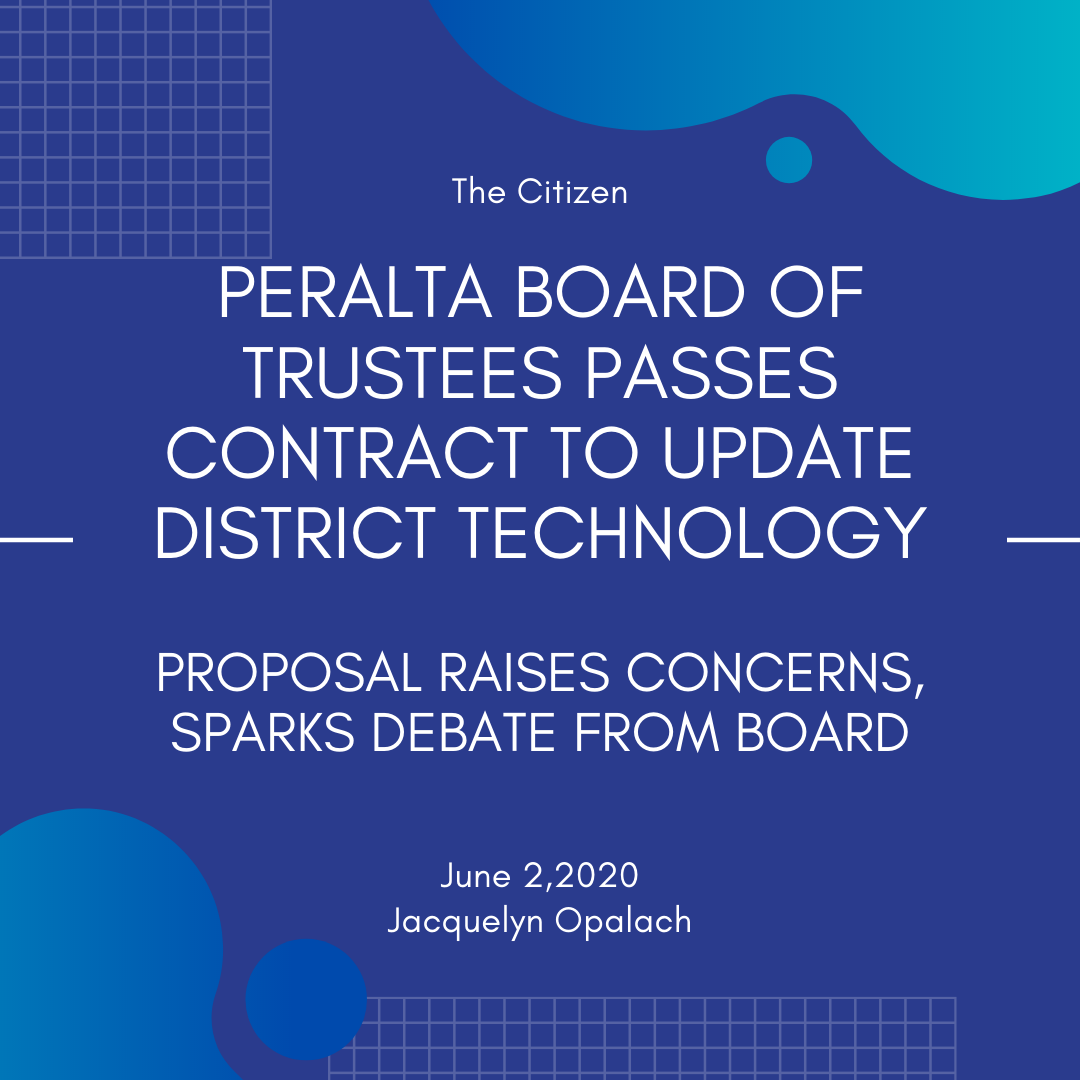
The Peralta Community College District Board of Trustees approved a $6,339,602.95 contract with Oracle designed to update Peralta’s PeopleSoft technology systems during a special meeting Friday, May 29.
The agenda for the special meeting came three days after trustees failed to ratify the contract during the regularly scheduled May 26 meeting.
During the May 26 meeting, trustees failed to approve the contract after nearly two hours of debate and confusion, which resulted in three “yes” votes and four abstentions. With the terms of the proposed contract set to expire May 31 — according to an email sent to The Citizen by Peralta Community College District Chancellor Regina Stanback Stroud — trustees called for the May 29 special meeting.
The contract, which was presented by Stanback Stroud, remained identical during both meetings and was intended to address concerns raised by FCMAT, CBT, and ACCJC reports. The contract deliverables include an update to PeopleSoft, the organization-wide software that houses Peralta’s student portal, human resources, benefits, and payroll systems, among other things, Stanback Stroud said. However, some trustees expressed concerns about the cost, the proposed five-year timeline, and creating accountability checkpoints for Oracle.
During the special meeting, Stanback Stroud delivered an updated presentation with a stated intention to ease some of the trustees’ concerns, emphasizing that the contract with Oracle would ultimately save the district money.
Oracle plans to complete the PeopleSoft update in three phases, with the first two phases complete by 2021 and paid for with the help of the Measure G bond approved by voters in 2018. The deliverables for the first two phases of the upgrade include migrating to the cloud and implementing modules on the enterprise system. For the following two to five years of the contract, the district will pay $300,000 annually — using general funds — to compensate for “ongoing operating costs” and “the ability to use the system,” Stanback Stroud said.
Currently, the district spends $900,000 per year on maintaining the current technology systems, according to Stanback Stroud.
The chancellor also argued that students have expressed a need for an updated system. Students currently undergo “very convoluted processes” to register and enroll in classes, and some eventually give up and attend college elsewhere, she said.
“It is important because it is at a time when we are saying we have a downward trend in enrollment, and we have a situation where the programs and services right now are not functioning at full capacity,” Stanback Stroud said. District leaders want to ensure that the system “makes it easy for a student to get in, to get through, and to graduate from our programs and services.”
Stanback Stroud also emphasized that the agreement will modernize HR processes and increase the district’s fiscal integrity.
However, Stanback Stroud’s presentation on Friday initiated a second debate rife with concerns similar to those expressed at Tuesday’s meeting. Though several trustees stated that they were in agreement that the system update is necessary, Stanback Stoud’s presentation didn’t alleviate all of their concerns. The timeline, cost, and previous experiences with information technology at the district were discussed for several hours before Trustee Bill Withrow made a motion to approve the contract.
“I don’t think anyone on this board does not think that we don’t need this yesterday,” said Trustee Linda Handy.
“What the board needed,” Handy continued, is “Assurances that Oracle is held so tightly that the district cannot be screwed.”
Both Handy and Trustee Nicky González Yuen expressed concern due to misleading communication in the past.
“The board has consistently trusted the administration and gotten burned, and that’s why I think you are seeing this board be extremely cautious in this area,” González Yuen said.
Handy said that “assurances” such as hiring a chief technology officer — a now vacant position — to ensure smooth communication between Oracle and the district, as well as holding the company accountable to due dates, and potentially having “out” clauses, would make her more comfortable with the contract.
Stanback Stroud said that based on interviews she has done with staff, she learned that in the past Peralta tried to install the technology on its own to save money, but wasn’t able to “keep up with the demands of that project.” When that happened, Oracle agreed to close out their previous contract with the district, Stanback Stroud said.
“We then learned from that,” Stanback Stroud said. “We do not have the capacity to be able to do a lot of those things. So we built into this contract that Oracle would be doing that technical work, and this is an organization that has done this successfully in many many institutions and enterprises so we have full confidence they’ll be able to do it successfully in Peralta Community College District.”
The district is “paying after the fact, and we’re paying based on deliverables,” Stanback Stroud said.
“That was a way of trying to address some of the concerns that people may have about, you know, ‘wait a minute we’ve been burned before, and how do we make sure that this doesn’t happen again,’”she said.
This time, Stanback Stroud said, Oracle will be doing all the work. She also said that she plans to hire a chief technology officer to ensure clear communication between Oracle and Peralta. Currently, Delisle Warden, the Interim General Counsel and Chief of Staff for the district, is overseeing the project.
Board of Trustees Vice President Cindi Napoli-Abella Reiss said she’d like a better understanding of Peralta’s current needs in terms of technological infrastructure.
“How do we even know that the scope of this contract is correct if we don’t know what the current needs and the current assessment is, on a high level?” Napoli-Abella Reiss said.
Napoli-Abella Reiss pointed to San Diego Community College District, which is one of two other California community college districts that has contracted with Oracle for PeopleSoft. She said that they had “problems along the way,” which were eventually solved by doing need assessments.
“The crossroads is when there’s so much money spent on technology, because it’s seen as the cure-all and antidote, and there isn’t thoroughness and completeness in both the scope and the implementation,” she said.
Napoli-Abella Reiss suggested that because Peralta has shown similar “fits and starts” as other districts, they should look toward those districts as an example before moving forward.
Stanback Stroud said that Los Angeles Community College District is using PeopleSoft “without issue,” and that San Diego Community College District only experienced difficulty because they chose to customize the software.
Board of Trustees President Julina Bonilla said that she abstained from Tuesday’s vote because of the cost.
“I am still struggling with trying to come to terms with, during this time of economic uncertainty, why we or any other district would engage in a five-year anything,” she said.
“I am uncomfortable committing 2.4 million dollars out of our general fund because of that economic uncertainty and what that means.”
Stanback Stroud said that agreeing to the contract was a matter of committing to five years of paying a smaller amount — or doing nothing and therefore continuing to pay the current $900,000.
After asking questions about the cost, González Yuen requested a presentation to the board verifying budget numbers.
“I think a good-faith demonstration of those figures looking backwards is critical because that is the essence of the argument that the administration is making here. I’m going to go along with it,” he said when it came to his vote, “because of the exigencies of this moment, which I’m resentful of.”
“I feel as though the board is constantly put in this position where, you know guns up against our head, ‘do this or else,’ ‘do this now, because if we don’t then the sky will fall’ — I can’t tell you how many times I’ve heard that.”
Previous news reports detail some of the history between Peralta and PeopleSoft.
The motion passed with one abstention from Trustee Napoli-Abella Reiss.
“For me, a strategic plan that collects data and gathers user information at all tiers and a high level assessment, a technical assessment, are still needed for me to substantiate a vote,” she said.
Trustee Karen Weinstein requested that in the future, the board is presented with more options. “It’s very hard to evaluate when you only have one system in front of you,” she said.
“My hope is that we are doing the right thing. And that you and everybody else is presenting what you think is the right thing. And if there are problems with that they will come up and we will discuss it at those times. We cannot predict everything,” Weinstein said.
“To some degree, we do have to hope for the best.”


























